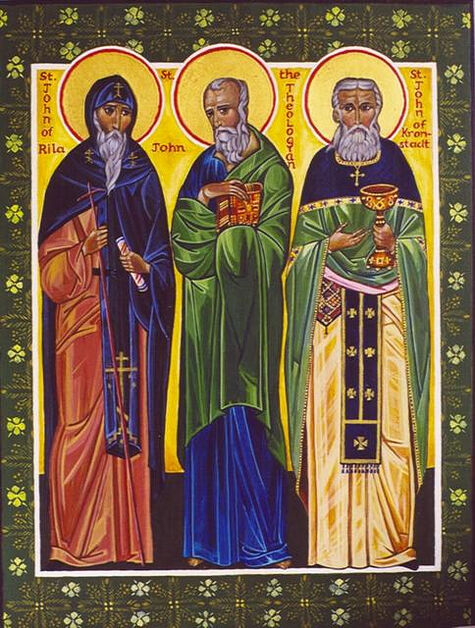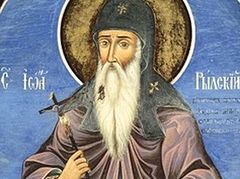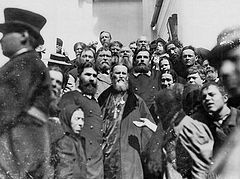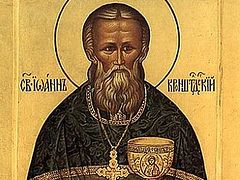This homily was delivered in the Cathedral of the Great Martyr Kyriaki in Sofia on October 19/November 1, 1946, on the feast of St. John of Rila, on the 1,000th anniversary of his holy repose. St. Seraphim also speaks of St. John of Kronstadt, who bore the name of St. John of Rila, but who was not yet formally canonized as a saint of the Church.
 R to L: St. John of Rila, St. John the Theologian, St. John of Kronstadt. Photo: pravimir.com
R to L: St. John of Rila, St. John the Theologian, St. John of Kronstadt. Photo: pravimir.com
The holy Church is celebrating the memory of St. John of Rila the Wonderworker today. This great God-pleaser is one of the most precious spiritual treasures of Bulgaria. St. John is the glory and beauty of the Bulgarian Church.
His grace-filled light shines far beyond the borders of Bulgaria. Besides the Bulgarian Church, he is venerated by all Orthodox Churches, and in particular the Russian Church. Russia has the city of Rilsk, founded in honor of St. John of Rila. After the War of Independence, the ecclesiastical and civil authorities of Bulgaria gave the Russian Church the right hand of their great Rila Wonderworker, which is still in Russia.
But St. John began to be especially venerated in our Russian land with the appearance of the great luminary of the Church, Fr. John of Kronstadt, who bore his name. The grace-filled glory of our great pastor is in large measure due to his Heavenly patron, St. John of Rila. Fr. John of Kronstadt loved him very much, imitated his angelic life, and as a sign of his deep reverence for him, he built churches and altars in honor of St. John.
It’s impossible not to take note, my beloved brothers and sisters in Christ, of that striking similarity that we see in the lives of these great righteous ones. When the demons inflicted beatings upon St. John and people abused him, he endured all of it with meekness and humility. When St. John was already endowed by God with great gifts of the Holy Spirit, a demoniac was once brought to him and he was asked to pray for the man’s healing. But St. John said: “Who am I to dare to do such a thing beyond my strength? I’m such a sinner that I’m not even worthy to look up to Heaven.” But they kept asking him to pray. The saint agreed, but only so that others would pray with him. And no sooner had St. John raised his hands to God than the evil spirit came out of the demoniac.
In the same way, Fr. John of Kronstadt, imitating the Rila Wonderworker and out of a sense of his deep humility, asked others to pray with him for the afflicted and others.
Once, Fr. John was seriously slandered by a chanter at the St. Andrew’s Cathedral where he was the rector. Instead of driving out this audacious chanter, the Kronstadt pastor asked him to calm down, to sit down, and to speak with him in peace and love. But the chanter so swore at him that the wondrous humility and angelic meekness of Fr. John had no effect on him at all, until another chanter, well-mannered and educated, came to Fr. John, who immediately put a stop to his rude colleague with a shout: “What kind of man are you? How dare you abuse your rector?”
For many years, Fr. John humbly endured terrible blasphemies and slander from his assistant, the archpriest and dean of St. Andrew’s Cathedral. He could have asked the Holy Synod, of which he was a member, to transfer this priest to another place. But Fr. John didn’t complain about him to anyone, only maintaining silence. When Fr. John became terminally ill, in his grave infirmity he tossed about, and kept asking to be put in his chair, then to be put on his bed. This priest came in a spirit of contrition, his conscience having strongly spoken up within him. He went to ask forgiveness from Fr. John and to bid farewell to him. Fr. John was sitting in his chair, semi-conscious. When they told him his assistant priest had come, then Fr. John gathered his last strength, arose from the chair, went to this priest, bowed before him, and kissed his hand. This great humility had such an effect on the priest that he burst into tears and threw himself at the feet of Fr. John. From that time on, he began to preach that Fr. John was the greatest God-pleaser and that such righteous ones haven’t been seen in the Orthodox Church since the very first centuries of Christianity.
What salvific edification ought we to take, my beloved, from all that we have said to you? If such a luminary like Fr. John of Kronstadt imitated St. John of Rila and learned the angelic life from him, then how can we, sinful people, not imitate him, not learn his Christian virtues from him? The holy Apostle Paul calls us to this, saying: Remember them which have the rule over you … whose faith follow (Heb. 13:7). What in particular should we imitate, what should we especially learn from St. John of Rila? He was humility incarnate. It’s not without good reason that the opening words of the troparion to St. John refer to him as a “foundation of repentance.” What else could be this foundation, if not humility? It pleased the Lord to place humility at the foundation of our entire Christian life, which is why He said: Blessed are the poor in spirit: for theirs is the Kingdom of Heaven (Mt. 5:3). This is why the Lord requires the same humility from us for our union with Him, when He says: Come unto Me … and learn of Me; for I am meek and lowly in heart (Mt. 11:28-29).
To acquire this humility, and especially before the holy Orthodox Church, St. John calls us not only with his life, but also with his writings. In his testament, which has come down to our day, St. John implores us to sacredly follow the teachings of the Church and not to deviate from them one iota. And in his letter to the Bulgarian King Peter, he exhorts him, and through him all of us, to fall at the feet of our Mother Church with repentance. This is what humility before the Church St. John requires of us.
Alas! How rare such humility is among us! How many Orthodox people have pride instead of humility in their attitude to our Mother Church and its teachings. In recent times, more than ever the distinguishing feature of our life is not the Orthodox faith, but a heretical one. We mean the host of heresies that trouble the Orthodox Church from all sides.
For example, many Orthodox people, who believe in Christ, deny the existence of the devil. But if the devil doesn’t exist with his evil spirits, then why does the Gospel tell us so much about Christ expelling the demons from people, about His healing those who are possessed? Additionally, in his first epistle, St. John the Theologian says: For this purpose the Son of God was manifested, that He might destroy the works of the devil (1 Jn. 3:8). Thus, by denying the existence of the devil, we deny the basic dogma of our faith—about the coming into the world of the Son of God to redeem and save us from the devil, because Christ’s appearance in the world would then become superfluous.
In the Nicene Creed, we confess the dogmatic truth about the Church, saying: “In One, Holy, Catholic, and Apostolic Church.” But many Orthodox Christians overturn this dogma, saying it’s not only in the Orthodox Church that you can be saved, but also in the Catholic and in the Lutheran churches, and in any sectarian community. These so-called “Orthodox Christians” don’t want to know that the regenerative grace of the Holy Spirit, which we receive during Baptism in the Sacrament of Chrismation, works and saves us only and exclusively in the Orthodox Church. As only those who were inside were saved on Noah’s ark, this prefiguration of our holy Church, so now only here, in the Orthodox Church and nowhere else do we receive salvation.
Unfortunately, there are such “theologians” in the Russian Church who claim that the dogmas of the Orthodox Church, like any science, are subject to development, to change, to elimination and replacement with new formulations. But after all, in their essence, our dogmas are the words of Christ; as the Epistle of the Eastern Patriarchs testifies, they are taken from the Gospel. Therefore, to say that our dogmas are subject to development is to assert that the words of Christ, the words of the Gospel, are subject to change. Thus, here there is apparently not only the desire to destroy all the dogmas of the Orthodox Church, but also blasphemy with the idea that the words of God Himself can be changed, as something imperfect, subject to development, whereas the Lord said: Heaven and earth shall pass away, but My words shall not pass away (Mt. 24:35).
We know what an evil modernism is in the Church, with its desire to convene an Eighth Ecumenical Council. The question is, why do modernists want to convene this council? To establish a married episcopate, to allow twice-married clergy, to weaken, if not completely destroy, monasticism, and to shorten the fasts, the feasts, and the length of the Divine services.
These modernists, known as Renovationists and those of the Living Church, have terribly shaken the Russian Church, and not so long ago. They and others were culprits in the great Church troubles and all kinds of disasters in Russia. What destruction they were preparing for the Russian Church is evident from the fact that the Renovationists undermined the most important foundation of the existence of the Orthodox Church—the holy canons—for they permitted a married episcopate and twice-married priests, and introduced other anti-canonical innovations.
It's clear that they and others wanted to destroy what had been established at the Seven Ecumenical Councils not only by the Holy Fathers of the Church, but by God Himself—the Holy Spirit, for the resolutions of these Councils took place in fulfillment of the Apostolic words: For it seemed good to the Holy Spirit, and to us (Acts 15:28).
Our preservation of the Orthodox faith, or Church teaching, which is alien to all heresies and every kind of modernism, is the fount of all the ineffable mercies of God to us. And what does it mean to preserve these teachings and this faith? It means keeping the testament of St. John of Rila—that is, to have humility before our Orthodox Church, which is the means of our salvation and the acquisition from God of all goods, both temporal and eternal.
Therefore, let us strive, my beloved, with all our might to acquire this humility, to which the great saint of God so calls us and which he so desires.
However, St. John calls us not only to humility before the Church. He calls us to humility before others as well. By the example of his personal life, St. John shows how humbly we should relate to the shortcomings and even the malice of others against us. Oh, if we would always remember and sacredly preserve this humility of St. John! Then we would have no disputes and there would be none of those misfortunes in our life that so often arise because of our pride. This is why the Holy Fathers of the Church testify that all our misfortunes and all kinds of evil are permitted to come to us by the providence of God because of our pride, because of our arrogance both before God and before others; for all of Divine providence is directed towards humbling us.
Therefore, let us, my beloved children in Christ, however we can, reject our pride—the main source of all our vices and all our troubles. Let us strive with all our might to ever emulate the humility of St. John, the great Rila Wonderworker, as we commemorate a thousand years since his repose this year.
For the sake of humility, the Lord grants us His grace as a conquering power over all evil, in fulfillment of the words of Sacred Scripture: God … giveth grace to the humble (Prov. 3:34, 1 Pt. 5:5, Jas. 4:6). Then the Lord will not only remove all of our misfortunes from us, but will also glorify and exalt us by His strength and great power, that the words of the Apostle Peter might be fulfilled with us: Humble yourselves therefore under the mighty hand of God, that He may exalt you in due time (1 Pt. 5:6). The Lord also grants us salvation both here and in the future life for the sake of humility, and He will fully apply to us the words that He spoke through the divine Psalmist: The Lord … saveth such as be of a contrite spirit (Ps. 33:19).



